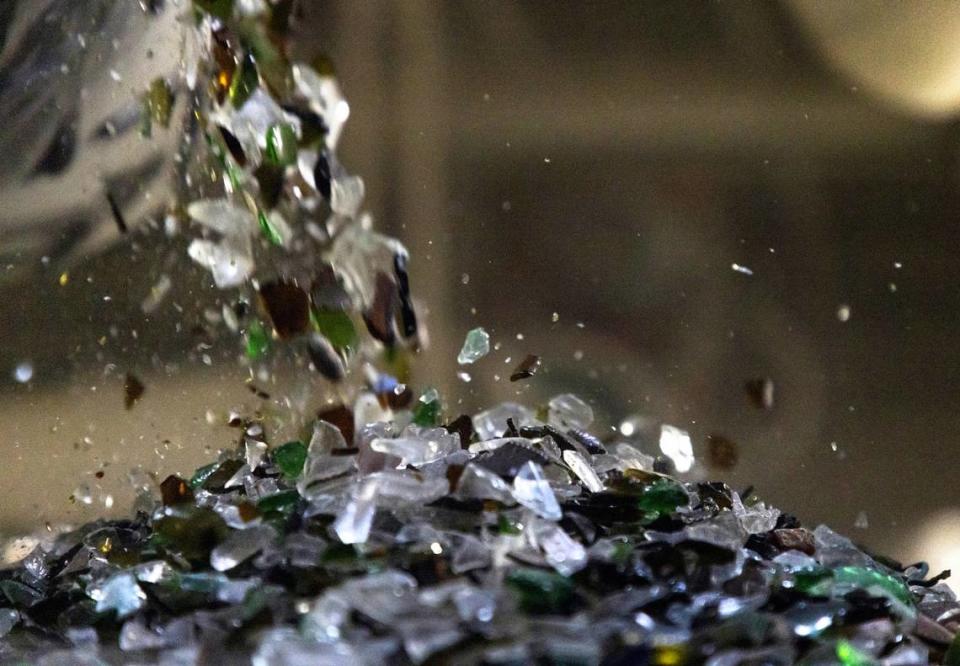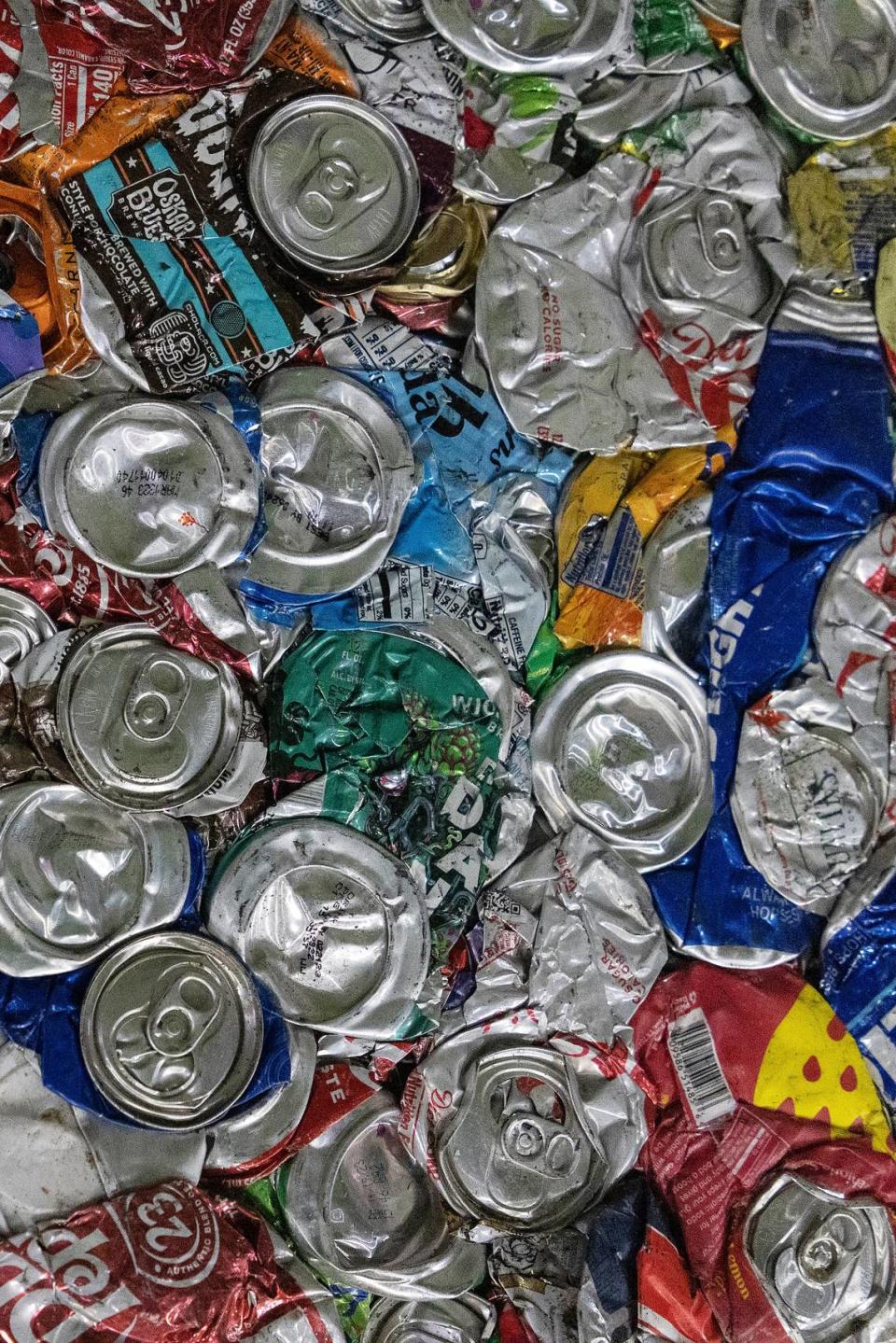Is recycling worth it? We dove into recycling in Raleigh and this is what we learned
The issues surrounding recycling — particularly the recycling of plastic — can be divisive. Some are gung-ho about it, while others argue it’s a waste of time, or worse, a scam. Even the most dedicated recyclers might sometimes wonder if their efforts are making a difference.
A reader recently contacted us to ask if collecting items for the curbside bins does any good.
“Is it worth my time to recycle to help the environment?” the reader asked. “How much of my recycling products are used and not put in the landfill?”
The News & Observer visited recycling facilities in Raleigh and surrounding areas over the course of a month, tracking recyclable items from the curbside to their transformation into shiny, brand-new things.
We slapped on our hard hats and neon vests and got an up-close look at how the Triangle’s recyclables are sorted, processed and broken down, avoiding North Carolina’s ever-growing landfills and popping up once more on the supermarket shelves — this time a pickle jar, orange juice jug or cat food can.
Here are the five biggest things we learned digging into Raleigh’s recycling process:
1. Recycling really happens. And it makes a difference.
Curbside recycling is known as “single-stream recycling,” since a variety of materials (like plastic, paper, aluminum, glass and more) are brought to their first stop on the recycling journey — a material recovery facility — in one single stream.
Raleigh’s curbside recycling trucks deliver items to Sonoco, a recycling plant on South Rogers Lane that separates the materials by product type and ships them to recycling plants that process each material individually.
“There is a local market for all these materials, something other than a landfill,” Patrick McDonald, a senior manager at Sonoco, said.
“So if it’s not being recycled and not going to a (material recovery facility) like ours, it’ll wind up in a landfill. Which is a waste, both because the product is taking up space in a landfill, and because companies like ours use the material.”
About 80% of the materials brought to Sonoco are recycled, McDonald said. (The other approximately 20% of items should have never been sent to the facility in the first place, such as food waste and textiles.)
2. Lots of Raleigh’s plastic items have become UNC garments.
In North Carolina, glass and plastic recycling are fully local processes. Glass becomes new glass products at a plant in Wilson, and a lot of plastic is melted and extruded into synthetic fiber, or yarn, in facilities in Reidsville and Yadkinville.
Brands like Levi’s and Teva buy Unifi’s yarn and spin it into products such as apparel, shoes and accessories.
At the University of North Carolina at Chapel Hill, a university spokesperson told us this yarn is woven into sporting apparel and graduation robes.
3. We’re probably doing some of our recycling wrong.
There are some things that just don’t belong in the curbside recycling bin or community recycling dumpster.
We learned more about those items and also answered frequently asked questions about recycling troublesome items in Raleigh, like pizza boxes, batteries, bubble wrap and more.
4. A lot of “non-recyclable” items actually can be recycled, but differently than you might think.
Curbside recycling isn’t the only way to recycle, though it’s arguably the easiest.
Private organizations and countywide drop-off points can help you recycle the items you can’t throw in your bin outside.
5. Recycling looks different between municipalities in the Triangle.
We looked closely at Raleigh’s recycling programs, specifically following plastic and glass items as they become new items locally to the Triangle.
If you’re looking to recycle in another Triangle town — like Chapel Hill, Durham, Cary, Clayton or elsewhere — check with that municipality’s recycling program to get your specific questions answered.
There’s more information about recycling in other Triangle counties or municipalities below.
Recycling in Johnston County
Many municipalities within Johnston County offer curbside recycling collection. To learn more about curbside recycling and drop-off centers throughout the county, visit johnstonnc.com/solidwaste and click on “Recycling.” Next, click on “How to Recycle within the Towns” for municipalities’ contact information.
You can also call 919-938-4750.
Recycling in Orange County
Residents of single-family homes or duplexes in Hillsborough, Carrboro and Chapel Hill are eligible for weekly curbside recycling. Orange County also offers rural curbside recycling every other week, multi-unit housing recycling and commercial recycling. For more information, visit orangecountync.gov/795/Solid-Waste-Management or call 919-732-8181.
Orange County also has a recycling app. Search “Orange County NC Recycles” in the Apple or Google Play store to find a material search tool, collection calendar and more.
Recycling in Durham
There are separate curbside recycling programs for the City of Durham and Durham County.
▪ The City of Durham: For information, call 919-560-4186 or visit durhamnc.gov/862/Recycling. Residents can also download the City of Durham’s recycling app by searching “Durham Rollout” in the Apple or Google Play store.
▪ Durham County: Unincorporated residents can receive biweekly curbside recycling. For information, call 919-560-0433 or visit dconc.gov and search “Roadside Collection.”
Recycling in Wake County
Cities and towns within Wake County offer their own recycling collection programs.
To get information for your municipality, call 919-856-7400, or visit wake.gov and search “Solid Waste and Recycling Resources.” Next, click “Municipal Curbside Collection” to find websites and phone numbers for each municipality in the county.

 Yahoo Autos
Yahoo Autos 













